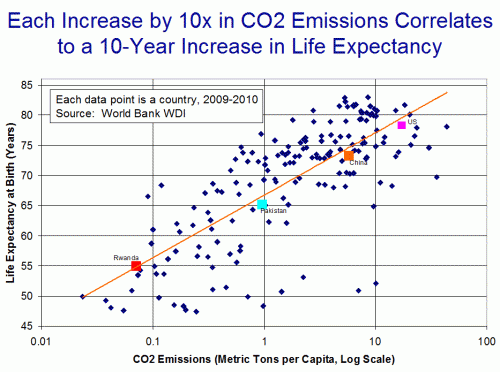Frequent readers of this blog will know that I am enormously skeptical of most fuel and efficiency numbers for electric vehicles. Electric vehicles can be quite efficient, and I personally really enjoy the driving feel of an electric car, but most of the numbers published for them, including by the government, are garbage. I have previously written a series of articles challenging the EPA's MPGe methodology for electric cars.
In just a bit, I am going to challenge some numbers in a recent WSJ article on electric vehicles, but first let me give you an idea of why I don't trust many people on this topic. Below is a statement from Fueleconomy.gov, which bills itself as the official government source for fuel economy information (this is a public information, not a marketing site). In reference to electric vehicles, it writes this:
Energy efficient. Electric vehicles convert about 59–62% of the electrical energy from the grid to power at the wheels—conventional gasoline vehicles only convert about 17–21% of the energy stored in gasoline to power at the wheels
The implication, then, is that electric vehicles are 3x more energy efficient than cars with gasoline engines. I hope engineers and scientists can see immediately why this statement is total crap, but for the rest, here is the problem in short: Electricity has to be produced, often from a fossil fuel. That step, of converting the potential energy in the fuel to use-able work, is the least efficient step of the entire fuel to work process. Even in the most modern of plants it runs less than a 50% conversion efficiency. So the numbers for the gasoline cars include this inefficient step, but for the electric vehicle it has been shuffled off stage, back to the power plant which is left out of the calculation.
Today I want to investigate this statement, which startled me:
Factor in the $200 a month he reckons he isn't paying for gasoline to fill up his hulking SUV, and Mr. Beisel says "suddenly the [Nissan Leaf] puts $2,000 in my pocket."
Yes, he pays for electricity to charge the Leaf's 24-kilowatt-hour battery—but not much. "In March, I spent $14.94 to charge the car" and a bit less than that in April, he says.
This implies that on a cost-per-mile basis, the EV is over 13x more efficient than gasoline cars. Is this a fair comparison? For those who do not want to read a lot of math, I will preview the answer: the difference in fuel cost per mile is at best 2x, and is driven not by using less fossil fuel (the electric car likely uses a bit more, when you go all the way back to the power plant) but achieves its savings by using lower cost, less-refined fossil fuels (e.g. natural gas in a large power plant instead of gasoline in a car).
Let's start with his estimate of $14.94. Assuming that is the purchased power into his vehicle charger, that the charger efficiency is 90%, and the cost per KwH in Atlanta is around $0.11, this implies that 122.24 use-able KwH are going into the car. Using an estimate of 3.3 miles per KwH for the Leaf, we get 403 miles driven per month or 3.7 cents per mile in electricity costs. This is very good, and nothing I write should imply that the Leaf is not an efficient vehicle. But its efficiency advantage is over-hyped.
Now let's take his $200 a month for his Ford Expedition, which has an MPG around 15. Based on fuel prices in Atlanta of $3.50 a gallon, this implies 57 gallons per month and 857 miles driven. The cost is 23.3 cents per mile.
Already we see one difference -- the miles driven assumptions are different. Either he, like a lot of people, don't have a reliable memory for how much he spent on gas, or he has changed his driving habits with the electric car (not unlikely given the shorter range). Either way, the total dollar costs he quotes are apples and oranges. The better comparison is 23.3 cents per mile for the Expedition vs. 3.7 cents a mile for the Leaf, a difference of about 6x. Still substantial, but already less than half the 13x difference implied by the article.
But we can go further, because in a Nissan Leaf, he has a very different car from the Ford Expedition. It is much smaller, can carry fewer passengers and less cargo, cannot tow anything, and has only 25% of the Expedition's range. With an electric motor, it offers a very different driving experience. A better comparison would be to a Toyota Prius, the c version of which gets 50MPG. It is similar in most of these categories except that it has a much longer range, but we can't fix that comparison, so just keep that difference in mind.
Let's look at the Prius for the same distances we calculated with his Leaf, about 403 miles. That would require 8.1 gallons in a Prius at $3.50, which would be $28.20 in total or 7 cents a mile. Note that while the Leaf still is better, the difference has been reduced to just under 2x. Perhaps more importantly, the annual fuel savings has been reduced from over $2200 vs. the Expedition that drove twice as many miles to $159 a year vs. the Prius driving the same number of miles. So the tradeoff is $159 a year savings but with much limited range (forgetting for a moment all the government crony-candy that comes with the electric car).
$159 is likely a real savings but could be swamped by differences in long-term operating costs. The Prius has a gasoline engine to maintain which the Leaf does not, though Toyota has gotten those things pretty reliable. On the other hand the Leaf has a far larger battery pack than the Prius, and there are real concerns that this pack (which costs about $15,000 to manufacture) may have to be replaced long before the rest of the car is at end of life. Replacing a full battery pack after even 10 years would add about $1200 (based on discounted values at 8%) a year to operating costs, swamping the fuel cost advantage.
Also note that a 2x difference in fuel costs per mile does not imply a 2x difference in fuel efficiency. Gasoline is very expensive vs. other fuels on a cost per BTU basis, due to taxes that are especially high for gasoline, blending requirements, refining intensity, etc.) Gasoline, as one person once said to me way back when I worked at a refinery, is the Filet Mignon of the barrel of oil -- if you can find a car that will feed on rump steak instead, you will save a lot of money even if it eats the same amount of meat. A lot of marginal electric production (and it is the margin we care about for new loads like electric cars) is natural gas, which is perhaps a third (or less) the cost of gasoline per BTU. My guess is that the key driver of this 2x cost per mile difference is not using less fuel per se, but the ability to use a less expensive, less-refined fuel.
Taking a different approach to the same problem, based on the wells-to-wheels methodology described in my Forbes article (which in turn was taken directly from the DOE), the Nissan Leaf has a real eMPG of about 42 (36.5% of the published 115), less than the Prius's at 50. This confirms the findings above, that for fossil fuel generated electricity, the Leaf uses a bit more fossil fuels than the Prius but likely uses much less expensive fuels, so is cheaper to drive. If the marginal electrical fuel is natural gas, the Leaf also likely generates a bit less CO2.

